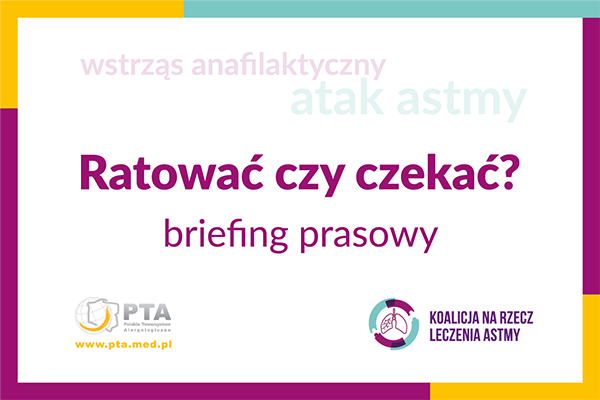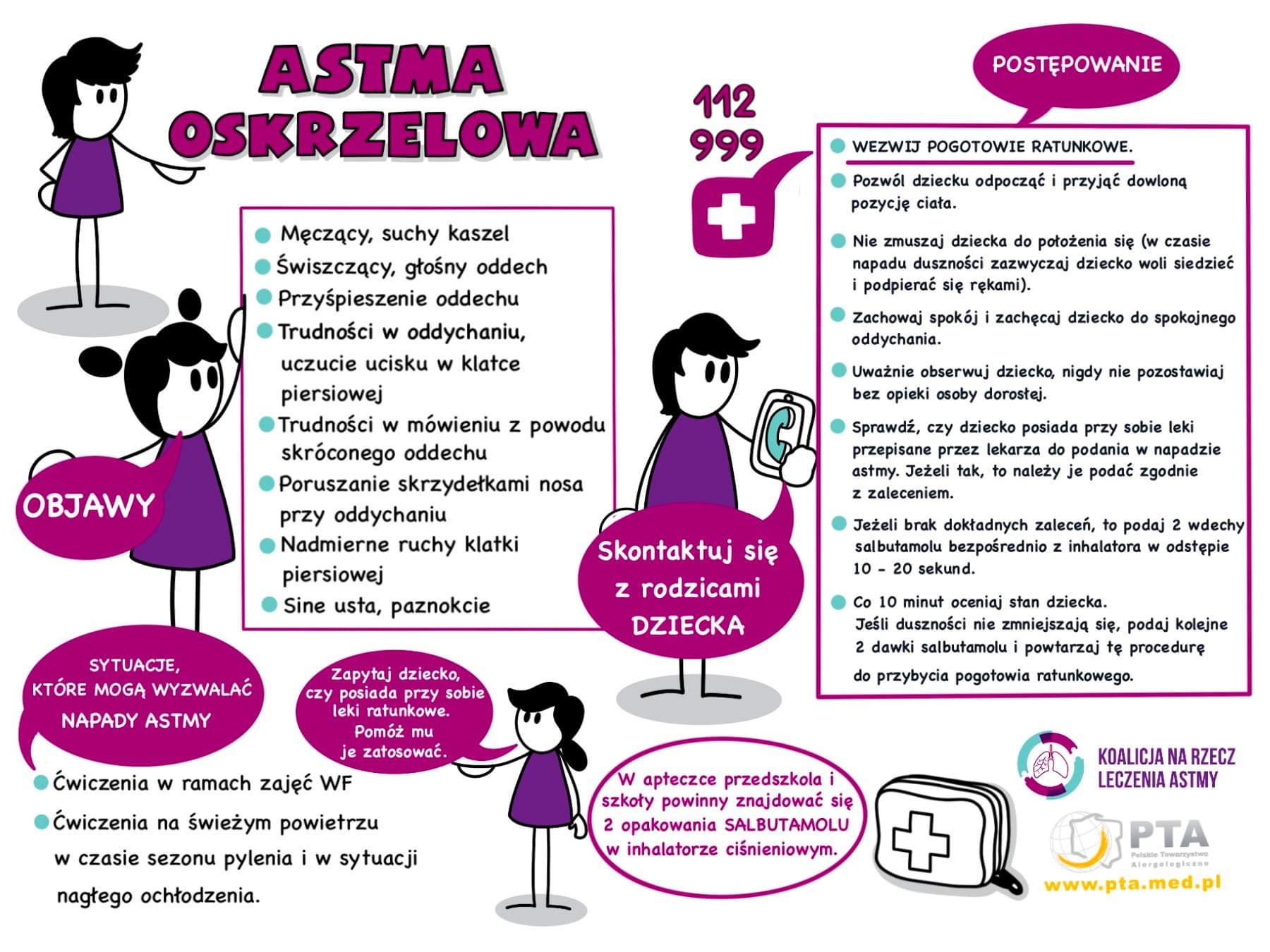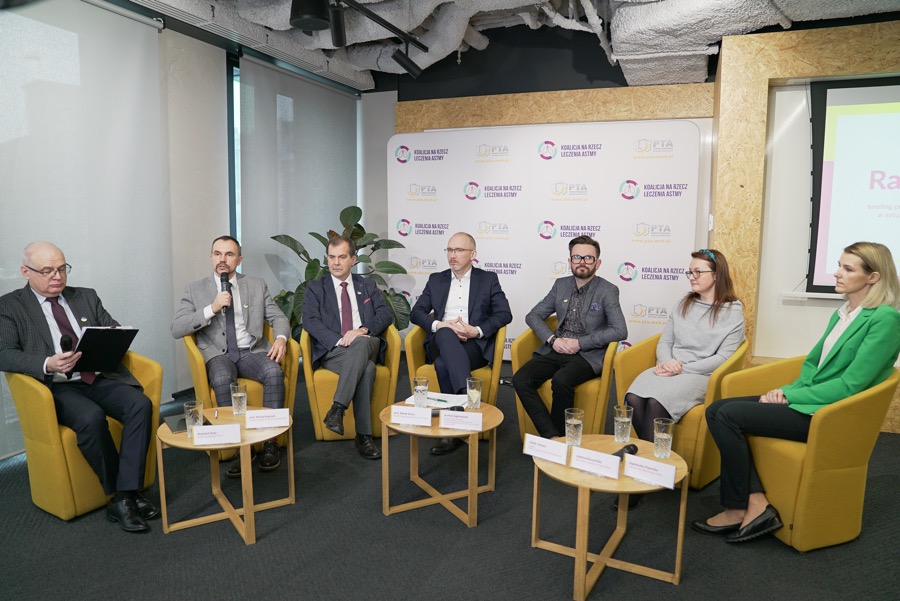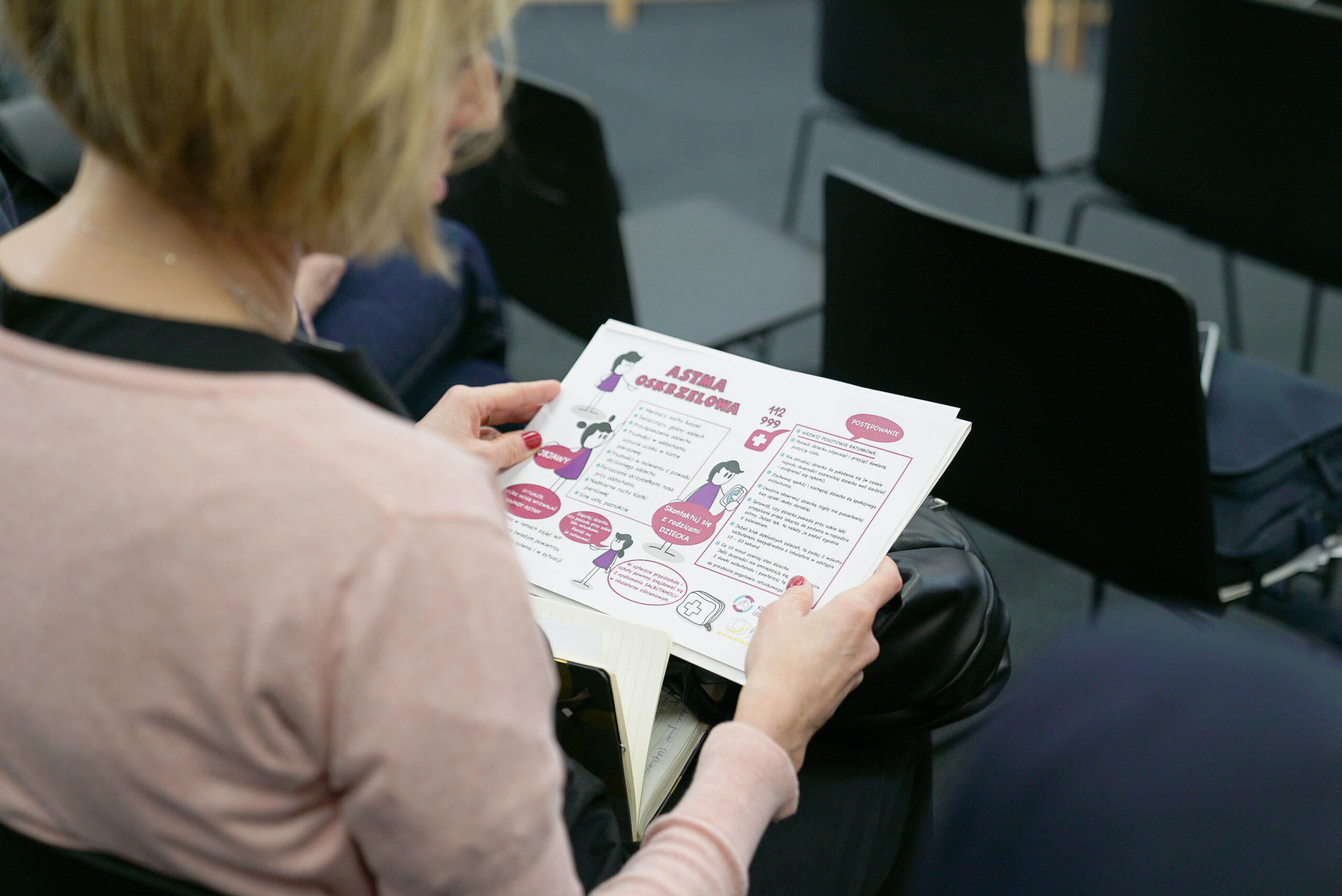PRESS BRIEFING

March 15 this year. there was a press briefing entitled Save or wait? As we have already mentioned many times, so far there is no legal regulation clearly defining how an employee of a school or kindergarten should behave in the event of an anaphylactic shock or an asthma attack in a child located in an educational institution. The topic is complex and debatable. Unfortunately, one thing is for sure. In such situations, time plays a significant role, because the child’s life depends on the speed of drug administration (adrenaline – anaphylactic shock, salbutamol – asthma). At the request of the Ministry of Health, our experts developed recommendations showing the behavior patterns of an adult in the immediate vicinity of a sick child and the requirements for equipping facilities with life-saving drugs.
In addition to immediately calling professional medical help, the witnesses of the incident are obliged to provide assistance in emergency situations of life or health threats, in accordance with with the principles of providing first aid. A severe allergic reaction or a severe acute exacerbation of a chronic allergic disease may occur in an educational setting. What should a school or kindergarten employee do in such a situation?
As the Polish Society of Allergology, we are of the opinion that in the event of a child’s life threatening, such as in the case of an asthma attack or anaphylactic shock, the teacher should help the child. The current regulations leave too much freedom, not to say they are burdened with a legal loophole – says prof. Maciej Kupczyk, president of the Polish Society of Allergology – For years, we have been calling for a synergistic operation of the health sector and clinicians in order to change, for example, the act on the care of students or the definition of first aid, which is included in the act on emergency medical services. We are also open to training education staff in saving lives and administering injection drugs. We dream of a model similar to the solutions in the United States, where children with allergies are carefully and responsibly cared for not only by their employees, but also by their colleagues – adds prof. Kupczyk.
Not only our Society, but also, inter alia, The Allergia Foundation, a patient organization that has been taking steps to change the reality of people with allergies for years, is dealing with the duality of the current state of affairs. On the one hand, each person has a legal obligation to help a person whose life is at risk (this results not only from the act on emergency medical services, but also from the penal code), and on the other hand, gaps in definitions and regulations regarding specific situations leave space for fear and fear of legal consequences.
The Act on health care for students allows for the administration of medications to students during their stay at school to school staff who give their written consent. Unfortunately, there is a belief in society that prescription drugs, such as adrenaline, can only be administered by a medical professional. What’s more, this error is repeated by officials (e.g. the education department of one of the towns near Warsaw) and principals (we have a signal from one of the schools that the headmaster by order forbade teachers to provide first aid). Hence, it can be difficult to find a teacher who would sign a consent to administer medications, which in turn means that children are excluded from preschool care. Using our personal experiences of parents of children at risk of anaphylaxis and legal knowledge (we work as an attorney and legal advisor), we support parents and teachers of children with allergies and take steps to change the applicable law in this area – say Agnieszka Panocka and Joanna Kuczyńska, founders of the Allergia Foundation .
Recommendations on the conduct in educational institutions
Document entitled The recommendations of the expert group of the Polish Society of Allergology on the management of children and adolescents with allergies, including the issue of adrenaline administration in the event of anaphylactic shock in educational institutions, prepared by the experts of our Society and the Coalition for Asthma Treatment, were submitted to the Ministry of Health, where it is currently analyzed and it will be subject to consultation prior to its publication by way of announcement in the official journal. It describes the management of five allergic reactions that have the most severe consequences, including: anaphylaxis and asthma. In addition to the schemes of conduct, clinicians included guidelines regarding the necessity of the availability of life-saving drugs in schools and kindergartens.
Anaphylaxis is a severe, immediate (developing within minutes) allergic reaction that puts a baby’s life at risk. In the school’s first aid kit, in an easily accessible place, there should be 2-4 sets of adrenaline in the form of auto-injectors or pre-filled syringes, which should be administered intramuscularly into the anterolateral surface of the thigh in its upper third. Adrenaline is an injectable drug, but only this drug is able to reverse most of the mechanisms of anaphylaxis. Importantly, the consequences of incorrect administration or even exceeding the recommended dose are much smaller than the consequences of a passive attitude. Adrenaline is a drug that, in excess, causes an increase in blood pressure, expansion of the airways and an increase in blood sugar levels, but never death, says Prof. Zbigniew Bartuzi, chairman of the PTA Team for Adrenaline Availability at School.
Asthma is a chronic, inflammatory disease of the respiratory system, the worsening of which can directly threaten a child’s life. The life-saving drug is salbutamol, 2 packages of which should be in the first aid kit of each educational institution. The administration of this drug does not require a great deal of first aid knowledge as it is available in a pressurized inhaler. In the absence of specific recommendations, the child should be given 2 inhalations of the drug directly from the inhaler, 10-20 seconds apart – says prof. Marek Kulus, chairman of the Coalition for Asthma Treatment – At the end of last year, in order to improve the quality of care for patients with asthma, but also to educate the public about this disease entity, we established the Coalition. We believe that joining the forces of theoreticians and practitioners will bring tangible benefits in the form of, for example, the implementation of the e-Prescription 2.0 project by the Ministry of Health – adds prof. Kulus.
Manual for teachers
As part of educational activities, our Society, in cooperation with Barbara Grzelak, known as Gryzmolnik, developed a manual for dealing with an asthma attack. We showed step by step what activities an adult should take who is closest to the sick child – we invite you to download it.

Media about us:
- Rynekzdrowia.pl
- Termedia.pl
- Medicalpress.pl
- Natemat.pl
- Medexpress.pl
- Twitter.com – Polskie Towarzystwo Chorób Atopowych (PTCA)
- portal.librus.pl
- msn.com
- kierunek farmacja.pl
- monitor rynkowy.pl
- biznes.newseria.pl
- suski.dla was.info
- radioswinoujscie.pl
- ozo.com.pl
- zdrowie.wprost.pl
- zdrowastrona.pl
- Twitter.com – Polskie Towarzystwo Chorób Atopowych (PTCA)
- Leksykon.com.pl
- urodzinowe.pl





